The Legislature Should Reauthorize the UW Medical Construction Contractor Alternative Process Because Timeliness and Quality Have Improved
Sunset Review Report 14-3, December 2014
The Legislature created an alternative process in 2010 that allows the University of Washington (UW) to pre-qualify contractors for certain critical patient care facility construction projects. These projects cost $5 million or less. The alternative process allows UW to limit distribution of bid solicitations to contractors that have demonstrated their ability to complete complex projects in a patient care environment.
The Legislative Auditor recommends that the Legislature continue the alternative process because its use is reducing contracting time, and contractor quality ratings have improved. The alternative process terminates June 30, 2015, unless the Legislature reauthorizes it. The Legislature tasked the Joint Legislative Audit and Review Committee (JLARC) with a sunset review before this date.
The report also includes three recommendations for UW, two to improve the timeliness of these projects at Harborview Medical Center and one to improve tracking the use of minority-owned and woman-owned subcontractors.
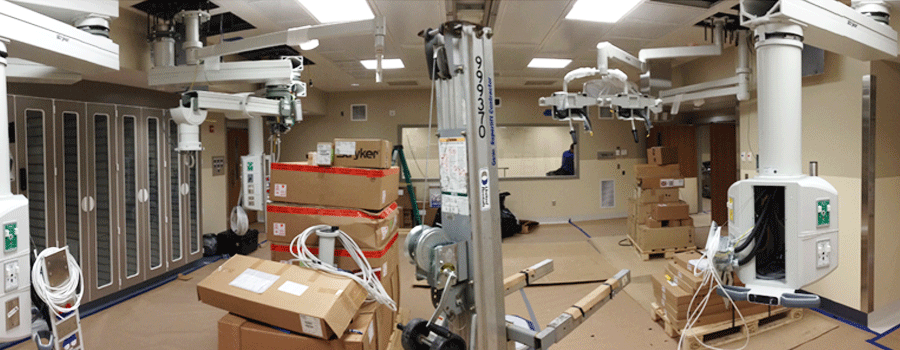
Construction in progress on a hybrid cardio vascular operating room
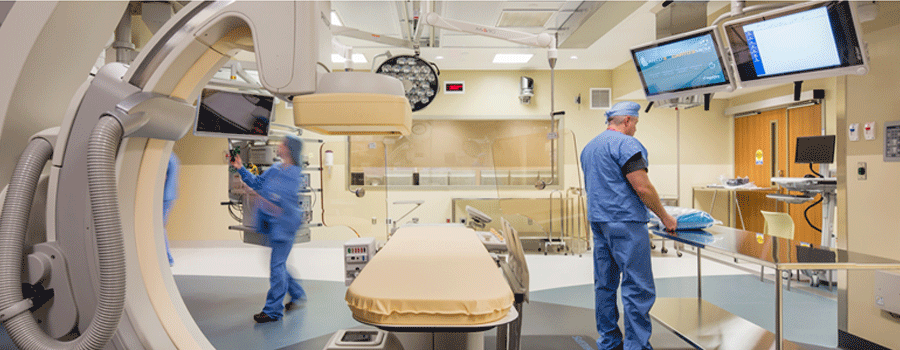
Completed room combines angiography with surgical functions
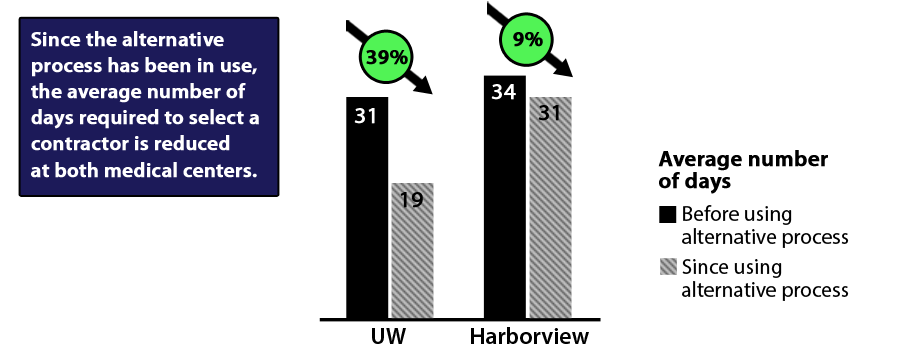
Source: JLARC staff analysis of UW critical patient care facility contracts for projects $5 million or less.
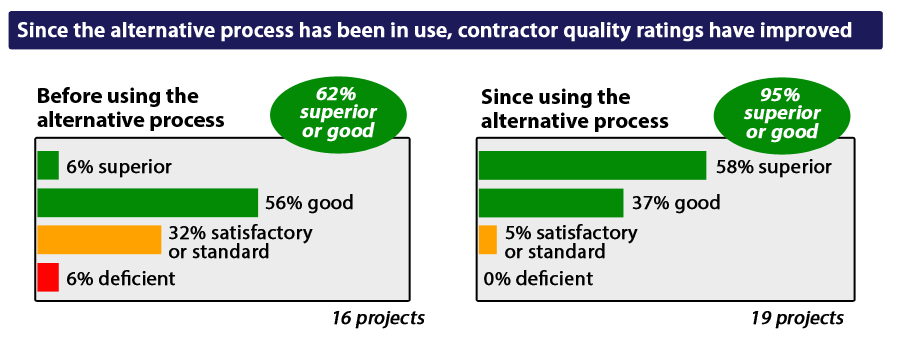
Source: JLARC staff analysis of UW critical patient care facility contracts for projects $5 million or less.
Why an alternative process?
PrintFriendly
During the 2010 legislative session, UW representatives testified that the purpose of this alternative procedure was to speed the selection of contractors for patient care and medical research facilities. They noted that many contractors lack the experience needed to work in an occupied hospital or patient care facility. According to the UW representatives, pre-qualifying contractors for these types of projects would save time by eliminating the need to screen out unqualified contractors for each project.

Unlike standard contracting procedures where UW would assess the qualifications of contractors after bids are submitted, the alternative process limits the request for bids to a roster of pre-qualified contractors.
Process terminates unless reauthorized
The Legislature enacted the alternative process with a June 30, 2015, termination date under the provisions of Washington’s Sunset Law (Chapter 43.131 RCW). The Sunset Law requires that the responsible organization (in this case, UW) develop performance measures and collect data to demonstrate how well the program is performing. JLARC is required to conduct a performance audit to verify the program’s performance in the year preceding the termination date and make recommendations on whether to continue the program.
Legislative Auditor Recommends:
-
1: Reauthorize the process
The Legislature should continue the alternative process for UW critical patient care facility contracting.Since 2010, UW has used the critical patient care facility alternative contracting process in a manner consistent with statutory requirements. JLARC review shows that the average time to select contractors for critical patient care facility projects using the alternative process at UW Medical Center (UWMC) declined by 12 days. Average contractor selection time for similar projects at Harborview Medical Center (Harborview) declined by three days. Project manager evaluations of contractor performance and quality for all projects increased from 62 percent “good” and “superior” prior to using the alternative, to 95 percent since the alternative process was authorized in 2010.
Legislation Required: Yes. Absent specific action by the Legislature, RCW 28B.20.744 terminates June 30, 2015. Fiscal Impact: None. Implementation Date: 2015 Legislative Session -
2: Review contractor selection
UW should identify opportunities to reduce the time to select contractors for Harborview projects. UW should report the results of its review to the Legislature and the Capital Projects Advisory Review Board.The greater reduction in the time to select contractors for UWMC projects compared to Harborview projects suggests that opportunities may exist to achieve additional reductions in the time to select contractors for Harborview projects.
Legislation Required: No. Fiscal Impact: JLARC staff assume this can be accomplished within existing resources. Implementation Date: June 30, 2015 -
3: Track woman/minority owned subs
UW should track use of woman- and minority-owned subcontractors on projects using the alternative process to determine whether it is meeting its internal goal.Although UW complies with the RCW 28B.20.744(7) requirement that it make an effort to reach out to woman- and minority-owned firms in its solicitations, no woman- or minority-owned firm has submitted qualifications for the alternative process rosters. These firms may participate as subcontractors but UW has not developed procedures to track the extent to which these firms participate as subcontractors in projects using the alternative process.
Legislation Required: No. Fiscal Impact: JLARC staff assume this can be accomplished within existing resources. Implementation Date: June 30, 2015 -
4: Review post-process steps
UW should review the other contracting steps that follow contractor selection to identify opportunities to reduce the time to begin constructing Harborview projects. UW should report the results of its review to the Legislature and the Capital Projects Advisory Review Board.Steps that follow the alternative process for contractor selection add time to Harborview projects. The time to obtain King County and UW approvals increased from 16 to 20 days since 2010 while the time required to issue notices to proceed (begin construction) increased from 8 to 15 days. The review should include the time it takes for UW to deliver contracts to King County, King County approval time, and the time for UW to issue notices to proceed. UW and King County should review these activities to identify opportunities to streamline these steps in the contracting process.
Legislation Required: No. Fiscal Impact: JLARC staff assume this can be accomplished within existing resources. Implementation Date: June 30, 2015
The Alternative Process at UW
-
What projects qualify?
Washington law allows UW to pre-qualify contractors for certain projects involving construction of critical patient care facilities. This alternative process is limited to projects within UW buildings used directly for critical patient care or highly specialized medical research where the estimated cost of the project is $5 million or less.
-
How has UW used it?
UW has used the alternative process for projects at the UW Medical Center (UWMC) located on the university campus and at the Harborview Medical Center (Harborview), which UW operates under an agreement with King County, the facility owner.
Between November 2010 and December 2013, UW used this alternative process for 27 projects totaling an estimated $10.5 million. Project values ranged from a low of $48,000 to a high of $2.4 million. Examples of projects constructed using the alternative process include:
UWMC
- Creating a hybrid cardio vascular operating room that combines angiography capability with the surgical functions of an operating room ($2.4 million).
- Renovating a room to accommodate installation of a new imaging machine and renovating an adjacent control room to accommodate installation of new support equipment ($237,000).
Harborview
- Establishing a Vascular Center of Excellence by renovating 5,320 square feet of vacant space to provide exam rooms, physician offices, work rooms, conference room, and support space ($727,800).
- Replacing existing computed tomography (CT) scan equipment with a new water-cooled model ($185,000).
The alternative process varies in two ways from the traditional process used for most public works procurement in Washington. As shown Exhibit 1, the alternative process allows pre-qualification of contractors and limits distribution of requests for bids only to qualified contractors. As a result, no additional time is needed to assess qualifications once bids are submitted. Except for these two differences, critical patient care facility projects follow public works contracting procedures.
Exhibit 1 - How the Alternative Process Differs from Traditional Public Works ContractingActivity Traditional Process Alternative Process Pre-screen contractor for qualifications No Yes Request for bids Open to all contractors Open only to contractors on roster Basis for Contractor Selection 1. Proposal
2. Qualifications
3. Price
1. Proposal
2. Price
Source: JLARC staff review of public works procurement law. -
Two alternative steps first
The alternative process consists of two steps as shown in Exhibit 2:
- Creating a roster of qualified contractors; and
- Selecting a contractor from the roster for a particular project.
Once the UW selects the contractor using the alternative process, the contract follows the same approval and authorization processes applicable to UWMC and Harborview projects not eligible for the alternative process.
Exhibit 2 - The Alternative Process Allows Contractor Pre-Qualification Source: RCW 28B.20.744(2) and (6) and JLARC staff analysis of UW contracting procedures.
Source: RCW 28B.20.744(2) and (6) and JLARC staff analysis of UW contracting procedures.Step 1: Creating a roster of qualified contractors
UW’s Capital Projects Office issues a request for qualifications annually which is open to all contractors. The request states the purpose for the solicitation and describes the requirements that contractors must meet in order to qualify. The most recent request identified nine requirements including:
- The contractor’s professional personnel capabilities,
- Past performance in similarly complex projects,
- Experience in project execution, and
- Approach to safety.
An evaluation committee reviews contractor qualifications to determine if they meet the requirements. Contractors meeting the requirements are placed on one of two rosters:
- Roster A: contractors qualify for all critical patient care facility projects.
- Roster B: contractors qualify for less complex critical care facility projects.
In addition to the annual solicitation process, contractors may submit their qualifications for evaluation at any time.
Step 2: Selecting a project contractor
The second step of the alternative process is selecting a contractor for an individual project. RCW 28B.20.744(6) requires that UW send a request for bids to all contractors on the appropriate roster. The request includes information on design specifications and requirements. Interested contractors submit sealed bids, and the contract is awarded to the lowest responsive bid from a responsible contractor. This second stage does not require further evaluation of contractor qualifications since contractors on the roster have already demonstrated their qualifications.
-
Two other steps follow selection
After using the alternative process to select a contractor, additional steps are required to finalize the contract before beginning construction (Exhibit 3). These steps include obtaining approval from King County for Harborview projects and approval from the UW Associate Vice President for Administration and Finance for UWMC and Harborview projects. Once UW completes these steps the university can issue a notice to proceed to the contractor.
Exhibit 3 - Once UW Selects a Contractor, Contracts Follow Standard Contracting Procedures Source: RCW 28B.20.744 and JLARC analysis of UW contracting procedures.
Source: RCW 28B.20.744 and JLARC analysis of UW contracting procedures.
Outcomes
-
Alternative Process Outcomes
-
Contracting time reduced
Reduced time required to identify the lowest responsive bid from a responsible contractorJLARC staff compared the time required to select a contractor for UWMC and Harborview projects before and after the alternative process was established in 2010. As shown in Exhibit 4, the average time required to select a qualified contractor has declined by 12 days for UWMC projects and by 3 days for projects at Harborview.
Exhibit 4 - Use of the Alternative Process Has Reduced Amount of Time to Select a Contractor Source: JLARC staff analysis of UW critical patient care facility contracts for projects $5 million or less.
Source: JLARC staff analysis of UW critical patient care facility contracts for projects $5 million or less.Related Legislative Auditor Recommendation
Recommendation 1: The Legislature should continue the alternative process for UW critical patient care facility contracting.
-
Project quality improved
Contractor quality ratings have improved since the alternative process was establishedAt the close of each project, the construction manager completes a quality evaluation of the contractor performance. As shown in Exhibit 5, the percentage of ratings of “good” and “superior” increased from 62 percent of projects to 95 percent of projects once UW began using the alternative process.
Exhibit 5 - Contractor Quality Evaluations Have Improved Source: JLARC staff analysis of UW critical patient care facility contracts for projects $5 million or less.
Source: JLARC staff analysis of UW critical patient care facility contracts for projects $5 million or less.Related Legislative Auditor Recommendation
Recommendation 1: The Legislature should continue the alternative process for UW critical patient care facility contracting.
-
Harborview contractor selection
The reduction in average contracting time has been greater for UWMC projects (12 days) than for Harborview projects (3 days). UW staff explained the difference as resulting from the need to coordinate with King County about the contract. According to UW staff, this coordination is informal and not documented. Formal coordination between UW and King County is achieved after contractor selection when UW sends the signed contract to the King County Facilities Management Department for review and approval. UW should review contractor selection activities for Harborview projects to identify the cause for the difference in performance between UWMC and Harborview projects. Specifically, UW should determine if coordination with King County during contractor selection streamlines timeliness.
Related Legislative Auditor Recommendation
Recommendation 2: UW should identify opportunities to reduce the time to select contractors for Harborview projects. UW should report the results of its review to the Legislature and the Capital Projects Advisory Review Board.
-
Statutory compliance
UW has complied with statutory requirementsRCW 28B.20.744 establishes a variety of procedural requirements for the UW to follow to establish the roster of qualified contractors and to solicit bids on a project. Review of selected project files shows that UW has complied with the statutory requirements (Exhibit 6).
Exhibit 6 - UW Has Complied with Statutory Requirements for Use of the Alternative ProcessSoliciting Contractor Qualifications Notices published in newspaper of general circulation 
Solicitation content consistent with statutory requirements 
Evaluation factors comply with statutory requirement 
Appeal process established 
Project Contractor Solicitation/Request for Bids Request sent to all contractors on roster 
Request content complies with statutory requirements 
Request includes minority outreach requirements 
Project Award Contract awarded to lowest responsible responsive bidder
 Source: JLARC staff analysis of selected contract files.UW could improve tracking of subcontracting with woman-owned and minority owned businesses
Source: JLARC staff analysis of selected contract files.UW could improve tracking of subcontracting with woman-owned and minority owned businessesAlthough UW complies with the RCW 28B.20.744(7) requirement that it make an effort to reach out to woman- and minority-owned firms in its solicitations, no woman- or minority-owned firm has submitted qualifications for the alternative process rosters. The statute requires that UW make an effort to solicit proposals from these firms to the extent allowed by the Washington State civil rights act. This law (RCW 49.60.400) prohibits “discrimination against or preferential treatment…on the basis of race, sex, color, ethnicity, or national origin in the operation of public employment, public education, or public contracting.”
UW established “voluntary” goals for FY 2013 that minority-owned and woman-owned business enterprise participation will equal 3 percent of UW public works contracts and 3 percent of construction dollars. A review of FY 2013 quarterly reports from the UW Business Diversity Office shows that UW did not achieve these goals. Moreover, UW’s Capital Projects Office does not track payments to subcontractors to determine if any payments were made to minority- or woman-owned firms.
Related Legislative Auditor Recommendation:
Recommendation 3: UW should track use of woman- and minority-owned subcontractors on projects using the alternative process to determine whether it is meeting its internal goal.
-
-
Steps Used For All Construction Contracts
-
Contract approval: mixed results
Once UW has selected a contractor using the alternative process, the contract must be approved by the facility owner. For UWMC projects, the UW Associate Vice President for Administration and Finance reviews and approves the contract. For Harborview projects, the King County Facilities Management Department reviews the contract to ensure that the project is identified in the county capital plan, that funding has been approved by the King County Council, and that funds are available.
The time required to obtain approval for UWMC projects has declined from an average of five days to four days since 2010 (Exhibit 7). In contrast, approval time for Harborview projects increased from an average of 16 days prior to 2010 to 20 days since 2010. Once King County returns an approved to UW, the average time for UW approval is one day.
Exhibit 7 - Contract Approval Takes Longer for Harborview Projects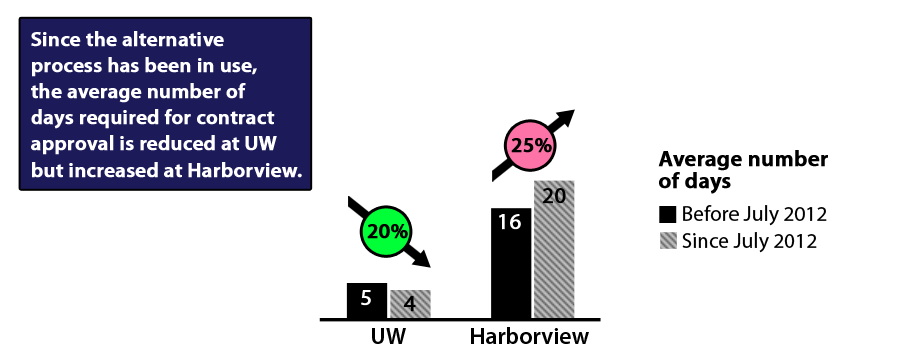 Source: JLARC staff analysis of UW critical patient care facility contracts for projects $5 million or less.
Source: JLARC staff analysis of UW critical patient care facility contracts for projects $5 million or less.One contributor to King County approval time is UW delay in forwarding contracts to the county once the contractor is selected. A review of six Harborview contracts shows that the average time for UW to send a contract to King County was seven days after contractor selection. Once received, King County averaged 11 days to review and approve these contracts. The average time for UW to forward these contracts to King County accounts for more than one-third of the King County review time.
-
Notice to proceed: mixed results
Once all approvals are in place, the UW Capital Projects Office issues a notice to proceed, which initiates the construction phase of the project as shown in Exhibit 8. For UWMC projects, UW issues a notice to proceed within 12 days of the final approval, a reduction of 4 days since the alternative process was initiated in 2010.
In contrast, the time required for UW to issue a notice to proceed for Harborview projects is 15 days, an increase of 7 days since 2010. UW staff state that the additional time needed for Harborview project notices to proceed is to ensure that Harborview is ready for the contractor to begin work. The notice to proceed begins project construction. If the site is not ready for the contractor to begin work, UW states that it may be liable for damages due to the delay.
Exhibit 8 - The Time for UW to Issue Notice to Proceed Has Declined for UWMC Projects But Increased for Harborview Projects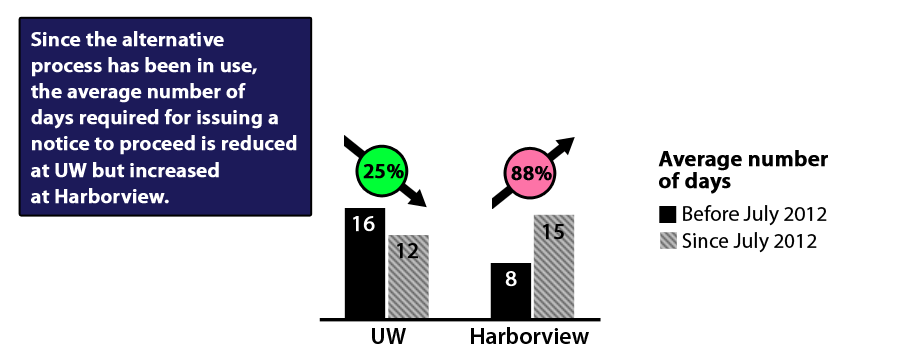 Source: JLARC staff analysis of UW critical patient care facility contracts for projects $5 million or less.
Source: JLARC staff analysis of UW critical patient care facility contracts for projects $5 million or less.Related Legislative Auditor Recommendation:
Recommendation 4: UW should review the steps that follow contractor selection to identify opportunities to reduce the time to begin constructing Harborview projects. UW should report the results of its review to the Legislature and the Capital Projects Advisory Review Board.
-
Sunset Questions Answered
The 2010 legislation establishing the alternative process for UW critical patient care facility construction projects includes a requirement for a sunset review. The Washington Sunset Act (Chapter 43.131 RCW) establishes the process for conducting sunset reviews and directs JLARC staff to answer four questions:
-
Compliance with legislative intent
Question One: Has use of the alternative process complied with legislative intent?Yes. Use of the alternative process has reduced the time required to select a construction contractor. The UWMC projects experienced a greater reduction (12 days) than did Harborview projects (3 days).
-
Efficiency, economy, cost controls
Question Two: Does the alternative process provide for efficient and economical public works construction, with adequate cost controls in place?Yes. UW has used the alternative for construction projects under $5 million that involve critical patient care facilities and complied with procedural requirements established by the Legislature.
-
Achievement of goals/targets
Question Three: Have projects constructed using the alternative process achieved expected performance goals and targets?Yes. The time to identify and select a critical patient care facility contractor has been reduced, although the reduction has been less for Harborview projects. In addition, contractor performance, measured by post completion quality evaluations, has increased from 62 percent rated as good or superior to 95 percent rated as good or superior.
-
Duplication of others' activities
Question Four: To what extent does the alternative process duplicate the activities of another agency or the private sector?Not at all. Public works contracting processes engage, rather than duplicate, the services of private sector contractors.
Agency responses:
Note: JLARC also requested a response from the Office of Financial Management (OFM). OFM responded that they did not have comments on this report
Contact
Authors of this Study
Mark Fleming, Project Lead, 360-786-5181
Valerie Whitener, Audit Coordinator
Keenan Konopaski, Legislative Auditor
Joint Legislative Audit and Review Committee
Eastside Plaza Building #4, 2nd Floor
1300 Quince Street SE
PO Box 40910
Olympia, WA 98504-0910
Phone: 360-786-5171
FAX: 360-786-5180
Email: JLARC@leg.wa.gov
Audit Authority
The Joint Legislative Audit and Review Committee (JLARC) works to make state government operations more efficient and effective. The Committee is comprised of an equal number of House members and Senators, Democrats and Republicans.
JLARC’s non-partisan staff auditors, under the direction of the Legislative Auditor, conduct performance audits, program evaluations, sunset reviews, and other analyses assigned by the Legislature and the Committee.
The statutory authority for JLARC, established in Chapter 44.28 RCW, requires the Legislative Auditor to ensure that JLARC studies are conducted in accordance with Generally Accepted Government Auditing Standards, as applicable to the scope of the audit. This study was conducted in accordance with those applicable standards. Those standards require auditors to plan and perform audits to obtain sufficient, appropriate evidence to provide a reasonable basis for findings and conclusions based on the audit objectives. The evidence obtained for this JLARC report provides a reasonable basis for the enclosed findings and conclusions, and any exceptions to the application of audit standards have been explicitly disclosed in the body of this report.
Committee Action to Distribute Report
On December 10, 2014, this report was approved for distribution by the Joint Legislative Audit and Review Committee.
Action to distribute this report does not imply the Committee agrees or disagrees with Legislative Auditor recommendations.
JLARC Members on Publication Date
Senators
Randi Becker
John Braun, Vice Chair
Annette Cleveland
David Frockt
Janéa Holmquist Newbry
Jeanne Kohl-Welles, Secretary
Mark Mullet
Ann Rivers
Representatives
Cathy Dahlquist, Asst. Secretary
Tami Green
Kathy Haigh, Chair
Ed Orcutt
Gerry Pollet
Derek Stanford
J.T. Wilcox
Hans Zeiger
Scope & Objectives
UW Authorized to Use Alternative Process for Certain Medical Facility Construction Projects Through June 2015
The 2010 Legislature authorized the University of Washington (UW) to use an alternative process for awarding contracts to construct, remodel, or improve facilities used for critical patient care or highly specialized medical research (SSB 6355, Section 11). Unlike the standard contracting process which allows any contractor to bid on construction projects, the alternative process allows the university to limit solicitations for critical patient care and medical research facilities to contractors with demonstrated experience working in these highly specialized environments.
The UW may only use the alternative process:
- When a project involves construction, renovation, remodeling, or alteration of improvements within a UW building that is used directly for critical patient care or highly specialized medical research; and
- When the estimated cost of the project is equal to or less than $5 million.
The UW’s authority to use this alternative process is scheduled to sunset on June 30, 2015 unless reauthorized by the Legislature. This alternative procedure is in addition to other alternative procedures (design-build, general contractor/construction manager, and job order contracting) specified in RCW 39.10.
Statute specifies the steps the UW must take to create a roster of contactors for critical patient care or specialized medical research facilities, or multiple rosters for different trade specialties or categories of work. Statute also identifies a set of criteria for a UW evaluation committee to include when assessing a contractor for inclusion on a roster.
The 2010 legislation further directs the UW to establish a procedure for obtaining bids from all contractors on a roster when the UW chooses to use the alternative process for a project. The UW must award the project to the responsible bidder submitting the lowest responsive bid.
Testimony Focused on Contracting Speed and Contractor Quality
During legislative hearings, UW representatives stated that the legislation’s purpose was to speed the selection of qualified contractors for critical patient care and specialized medical research construction projects. They emphasized that the challenges of working in an occupied hospital facility and the complexity of medical and research facilities require specific expertise and experience. The representatives said that the pre-qualification process would allow the university to evaluate contractor qualifications prior to soliciting bids. The representatives stated that this would not only speed contractor selection but would also provide contractors with assurance that they met the qualifications for the project before submitting a bid.
What Is a Sunset Review?
The Washington Sunset Act (Chapter 43.131 RCW) establishes the process for conducting sunset reviews. When a program is subject to sunset, the program terminates unless the Legislature reauthorizes the program. In the year prior to the termination date, the Joint Legislative Audit and Review Committee (JLARC) staff review the extent to which the program has complied with legislative intent and whether the program has met its performance targets.
The Legislature included a June 30, 2015, sunset date for UW’s alternative process for constructing critical patient care and highly specialized medical research facilities. JLARC staff will complete a sunset review of the UW’s use of this alternative process prior to the 2015 Legislative Session.
Sunset Review Objectives
Statute specifies the objectives for a sunset review, which include addressing the following questions:
The review will include a recommendation of whether to terminate, modify, or continue without modification the UW’s alternative process for awarding contracts for critical patient care or highly specialized medical research.
Timeframe for the Study
Staff will present the preliminary report in September 2014 and a proposed final report in December 2014.